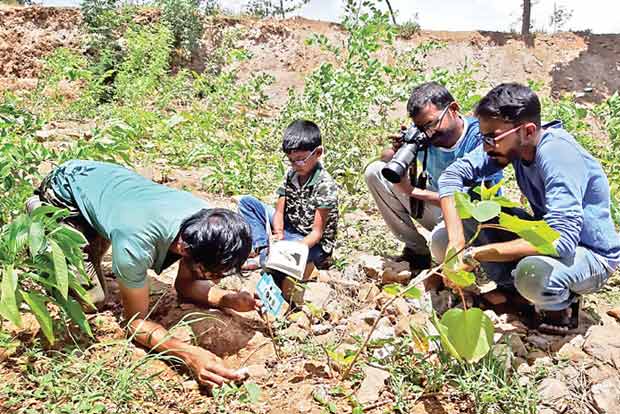Begin typing your search...
Kovai CUBE volunteers record 26 species in first ever ant survey
Every weekend, the Singanallur lake in the district buzzes with extra activity owing to a dedicated group of volunteers comprising naturalists, college students and scientists, who literally go on an ant trail around the sprawling water body.

Coimbatore
Armed with DSLR cameras, the team at the Centre for Urban Biodiversity Conservation and Education (CUBE) has now set out on a greater mission in what is probably Tamil Nadu’s first ant survey that is under way at the biodiversity hotspot here since the past five weeks.
“So far, we have recorded 26 varieties of ants. Of them, the names of 16 types have been known. Besides referring books, we have also shared images of the remaining ant species with experts across the country to identify them,” said V Sathish, 42, one of the volunteers at CUBE. The volunteer group, which comprises a core team of four people, spends hours at a stretch during weekends to study the ants. “This is the first phase of survey on ants and it requires greater effort on a massive proportion to estimate their population and factors affecting this little species,” Sathish added.
To a question on why the Singanallur lake was chosen, the team mentioned favourable conditions for the insect to thrive and pointed to most other areas abutting waterbodies here in the city having been taken over by buildings in the name of development. “While the focus is always on bigger animals and birds, ants, which are present everywhere, the ant is often neglected by the researchers. However, they play an important role in food chain management and in maintaining ecological balance in the system,” Sathish said. Ever wondered how ants follow an exact path? “Ants do not have ears, but can sense vibrations. Also, ants leave a scent trail for others to follow in its pursuit towards a food source. Nature has gifted it with its own natural GPRS system,” Sathish said.
With interesting aspects like these let known, the ant survey-which was initially planned for just a few weeks, has been extended following the excitement and commitment among volunteers.
On the significance of ants in the ecosystem, Priyadarsanan Dharma Raja, a senior fellow of Ashoka Trust for Research in Ecology and the Environment (ATREE) in Bengaluru said that ants play the role of predators as they are the most important agent of natural pest control. “They also act as scavengers as they consume carcasses. In addition, ants are also seed dispensers and pollinators. Ants constitute almost one per cent of all known insects. Interestingly, the total biomass of ants may equal or even be more than that of the total biomass of human beings,” he said.
Priyadarsanan, who is researching on ants, has been guiding the team as well. “Like any other insects, the major threat to ants comes from habitat loss mainly due to land use changes. The next major threat is from pesticides and other chemical pollutants. Invasive ants like the Asian yellow crazy ants (Anoplolepis gracilipes) also pose an important threat to the ant diversity,” he said. Apart from researchers, college students and youngsters also turn up for the study out of interest. “I came to the lake in the first week out of curiosity. Now I have become a regular participant as it is interesting to learn the wide diversity of ants and their behavioural pattern,” Chithran, a college student, said.
Visit news.dtnext.in to explore our interactive epaper!
Download the DT Next app for more exciting features!
Click here for iOS
Click here for Android
Next Story



